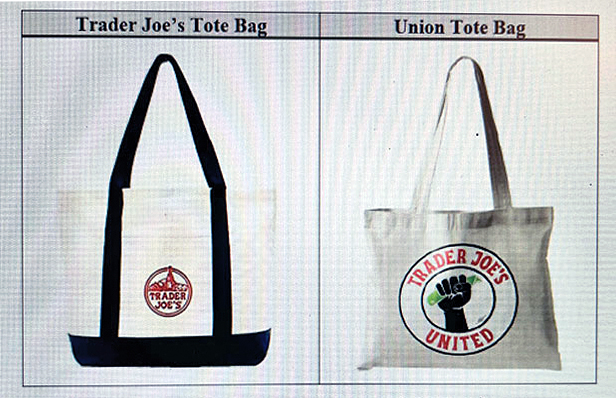June 06, 2024
Judge Orders Trader Joe’s To Pay $112K in Attorney Fees in Merch Trademark Case
The California-headquartered grocery chain is appealing the ruling, along with the dismissal of a swag-focused lawsuit it brought against its union workers amid a labor dispute.
A federal judge has ordered Trader Joe’s to pay more than $112,000 in attorney fees to a union representing the grocery chain’s workers in connection with a trademark case centered on branded merchandise.
Still, Trader Joe’s is appealing the order, as well as U.S. District Judge Hernán D. Vera’s January dismissal of the grocer’s lawsuit – a ruling in which the judge characterized the complaint as a meritless attempt to “weaponize the legal system to gain advantage in an ongoing labor dispute.”
Trader Joe’s originally sued the union, Trader Joe’s United, alleging that the body representing workers was selling tote bags, mugs, buttons, T-shirts and hooded sweatshirts that feature graphics/logos that violate the supermarket’s registered and common law trademarks.
The union, which is involved in a long-running battle with Trader Joe’s, sells the items on its website to help fund support for its efforts and to help foster solidarity among members and supporters.
Vera ultimately sided with the union, saying the logos/graphics are distinct, not least of all because the union’s features a raised fist – “widely recognized as a symbol of labor, social and political movements” – and a box cutter.
“The logos used by the union are in a different font, do not utilize the distinctive fruit basket design, apply concentric rings of different proportions, and are applied to products that no reasonable consumer could confuse as coming from Trader Joe’s itself,” wrote Vera in his dismissal.

A U.S. District judge dismissed Trader Joe’s trademark infringement case against union Trader Joe’s United, saying, in part, that the logo used by the union (right) is highly unlikely to be confused with the grocery chain’s logo (left) and therefore is not a trademark infringement. The judge also awarded the union attorney fee compensation of nearly $113,000. Both rulings are being appealed.
Following the win, Trader Joe’s United applied to have its attorney fees recouped. Vera used similar reasoning to his dismissal to justify awarding the union $112,622 in attorney fees. He reiterated that the case lacked merit – was “exceptionally weak” – and clearly brought in connection with the labor dispute.
Vera noted that shortly before Trader Joe’s filed the case, the National Labor Relations Board (NLRB) had issued a complaint against the grocer for unfair labor practices including retaliation, interrogation, threats and misrepresentations allegedly made during the recent union elections.
“Recognizing the extensive and ongoing legal battles over the union’s organizing efforts at multiple stores, Trader Joe’s claim that it was genuinely concerned about the dilution of its brand resulting from these trivial campaign mugs and buttons cannot be taken seriously,” Vera wrote.
Vera said the six-figure award of attorney fees would serve as proper compensation to the union and a deterrent to frivolous case filings of the type he felt Trader Joe’s had brought.
Trader Joe’s isn’t backing down, though. In May, attorneys for the company filed an appeal of the attorney fee order. Last week, the company also filed to have the fee payment stayed until the appeal process has concluded.
A Trader Joe’s spokesperson has previously said that the company will “continue to take all appropriate” steps to protect its legally held marks. “Trader Joe’s consistently takes legal action to protect our brand when we become aware that someone other than Trader Joe’s is selling merchandise using our trademarks and trade dress,” the spokesperson has said.
Cases involving trademark disputes centered on logos and apparel can be useful to promotional products companies, as the particulars of the allegations and details on how things play out can help industry firms navigate the complexities of intellectual property considerations in developing and providing solutions for clients.
